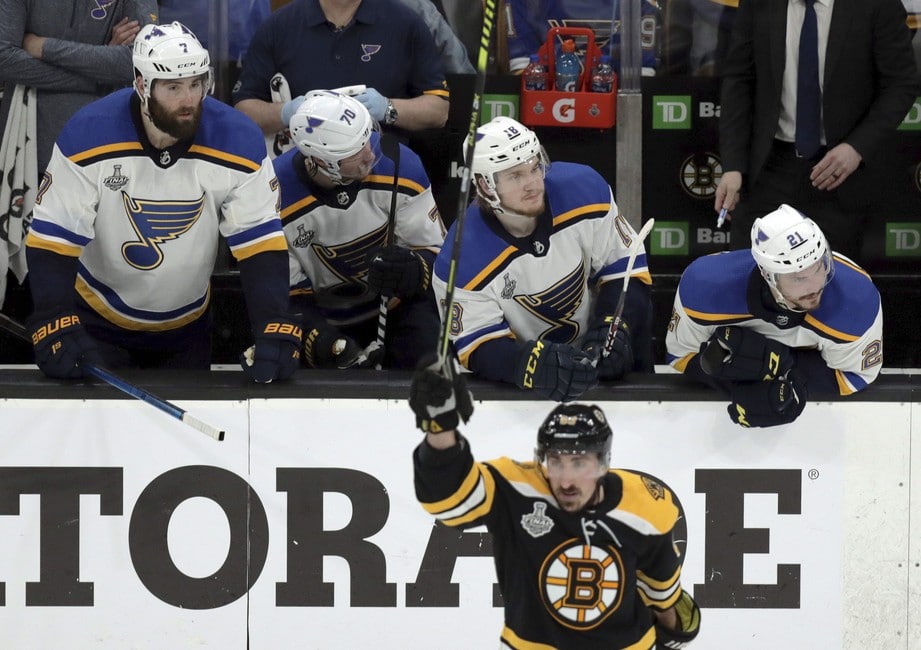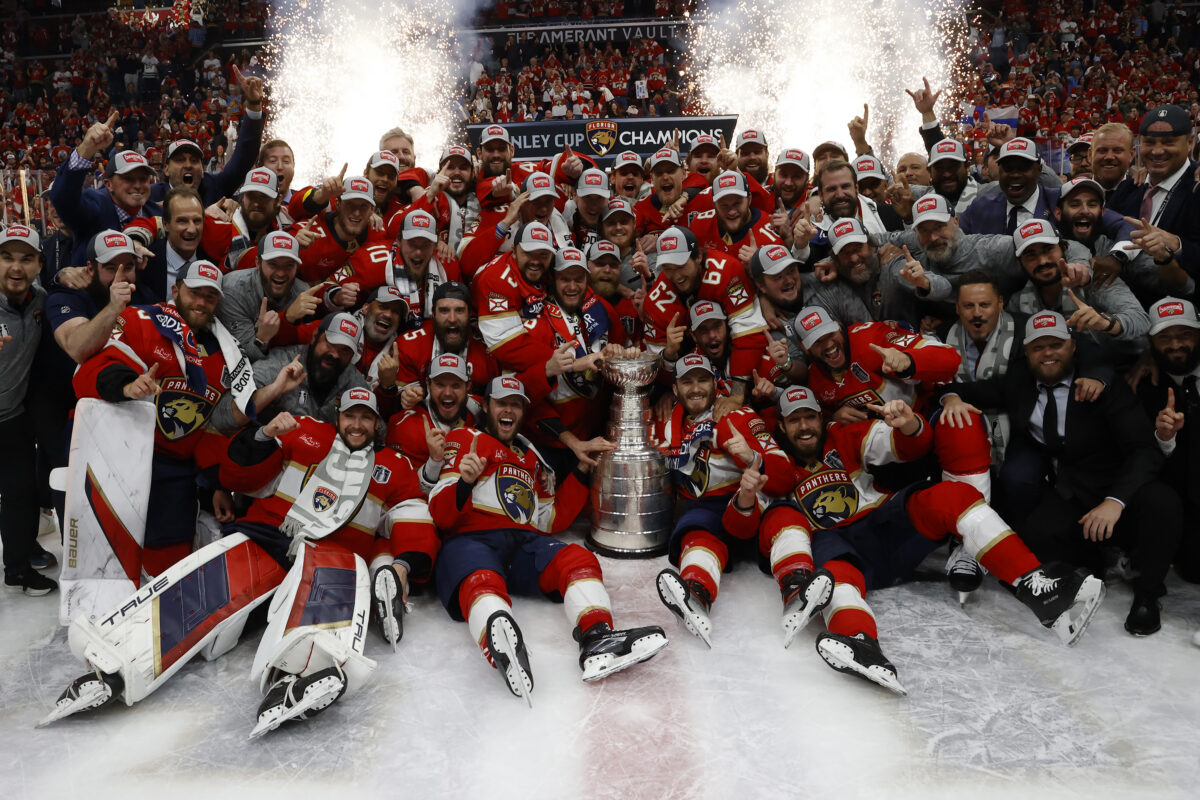Yes, I know what you’re thinking. The NHL Entry Draft is tonight. The day when franchises inspire hope with flashy draft picks, make significant personnel changes, and look toward the future. However, just a few short days ago, all eyes in the hockey world were on Amerant Bank Arena in Sunrise, FL. It was, of course, the crescendo of a Stanley Cup Final that was as drama- and storyline-filled as a playoff series that we’ve seen in recent memory. It wouldn’t be so bold to say that it was one of the biggest games played in the history of the NHL, definitely of recent generations. There were a number of reasons for this, the most significant of which was that it carried the potential to be the first Stanley Cup victory since 1942 where a team overcame a 3-0 deficit to win it all. It still deserves to be talked about.
Unfortunately for Edmonton Oilers fans, and those spread about Canada that wanted to see the country’s 30-plus season Stanley Cup drought end, that didn’t happen. As Florida Panthers head coach Paul Maurice said in his postgame interview on the ice, the team “needed to lose three games to learn how to win four.” They did just that with a defense-first, smash-mouth style of game led by Sergei Bobrovsky, Aleksander Barkov, Sam Reinhart, Carter Verhaege, Sam Bennett, and others.
The series was enthralling, intense, and evenly contested, albeit in a weird way. The high-end skill and stylistic matchup that it was arguably made it the best Final that we’ve seen in a long time. So, it begs the question – how does it compare to other recent Game 7s in the Stanley Cup Final? Well, let’s take a look now, and rank it against its counterparts.
No. 5: St. Louis Blues Defeat Boston Bruins (2019)
Let’s preface this by saying that all Game 7s are dramatic, exciting, and nerve-wracking. That’s the beauty of a winner-take-all scenario. Ranking them is like splitting hairs. But let’s engage in the exercise for the fun of it, shall we?
We’ll start with the most recent Game 7 before the 2024 edition. The Boston Bruins came out on the wrong side of a narrow series loss when they fell to the upstart St. Louis Blues in the 2019 Stanley Cup Final. A home-ice loss, in Boston no less, is as gut-wrenching as it gets, and it was their second straight defeat in the championship round (2013) after clinching in 2011 with a Game 7 victory of their own (more on that later).

The Blues resembled the 2024 Oilers in that they climbed out of an early season last-place hole to earn a playoff bid and fought their way through 19 playoff games to clinch a berth in the Final. The Bruins, on the other hand, cruised to a second-place finish in the Atlantic Division and dispatched the Toronto Maple Leafs, Columbus Blue Jackets, and Carolina Hurricanes in 17 games to reach the final round. So, why does this matchup with the Bruins fall fifth of the five most recent Game 7s? For one, the series itself was a back-and-forth affair, with only two one-goal games between them. Games 6 and 7 ended in 5-1 and 4-1 scores, respectively. Sure, one-sided affairs are great if you are a fan of the team, but for entertainment value, it doesn’t deliver as much juice. Each team deserves their props for putting themselves in a position to secure a championship, but in Game 7, we want drama, nail-biting action. It comes in at number five.
No. 4: Boston Bruins Defeat Vancouver Canucks in Wild, Penalty-Filled Series (2011)
Game 7 of the 2011 Stanley Cup Final, a 4-0 victory by the Bruins over the Vancouver Canucks, was the culmination of an absolute gong show of a playoff series. Premier NHL agitators and tough guys littered both rosters, including Brad Marchand, Shawn Thornton, Zdeno Chara, Andrew Ference, and Milan Lucic for the Bruins, and Ryan Kesler, Alex Burrows, Max Lapierre, Kevin Bieksa, and Raffi Torres for the Canucks. You could practically create a whole roster of players you hated playing against but no doubt loved having on your team. Not to mention, highly-skilled players such as Patrice Bergeron, Tyler Seguin, David Krejci, Daniel and Henrik Sedin, and Roberto Luongo were all over the ice and featured parts of the game plan on both sides.
This recipe made for a great series, riveting in its physicality, intensity, and skill. The Bruins, however, dominated Game 7 and cruised to a victory and therefore their first championship in 39 years, which set off a series of notorious riots in the streets of Vancouver following the game. This game falls in at number four simply because it failed to live up to the drama, quality, and expectation established by the previous six games.
No. 3: Hurricanes Defeat Oilers in First Cup Final Following Lockout (2006)
The 2005-06 season ushered in a new, post-lockout era of hockey, and culminated in a thrilling Stanley Cup Final between the Carolina Hurricanes and Oilers. Like many series that came before (and after), it featured generations old and new, with guys like Ryan Smyth, Chris Pronger, Doug Weight, Glen Wesley, Dwayne Roloson, and Rod Brind’Amour sharing the ice with Eric Staal, Cam Ward, Andrew Ladd, Jarret Stoll, Ales Hemsky, and other young players. Today’s game was a different brand of hockey than that of 2006, and the series was physical, and slower-paced, but still contained plenty of offense.
Game 7 of this series was notable from the standpoint that the Oilers roared back from a 3-1 series deficit to force the winner-take-all game. That was a rarely seen feat in hockey, let alone in sports, which raised the stakes considerably and paved the way for an epic deciding game, and it delivered. The Hurricanes built a 2-0 lead heading into the third period, but an early third-period goal by Fernando Pisani cut that lead in half and led to a razor-thin, intense final 19 minutes. The Hurricanes, of course, held on and secured their first Stanley Cup championship and the first of a new era in the NHL. The game famously was Pronger’s last in an Oilers uniform and was traded to the Anaheim Ducks that summer, where he would win a Cup of his own the very next season.
No. 2: Pittsburgh Penguins Avenge Series Loss in SCF Rematch With Red Wings (2009)
This series, in similar ways to the 2024 Final, carried a load of external factors and storylines. It was a rematch of the championship round from the previous season. Sidney Crosby, 21 years old and already the best player in the game at the time, Evgeni Malkin, and Marc-Andre Fleury, the young core that they were, attempted to get over the hump against a veteran, defensively minded team. They forced a Game 7 by holding off a Red Wings charge in a 2-1 Game 6 victory.
Related: Top 10 Memorable Games of the Crosby Era
Game 7 followed a similar script to Game 6 in that it was a close, defensive effort on both sides with minimal offensive exchanges. As is the standard in playoff hockey, heroics often come from sources you wouldn’t expect, and this game was no different. Maxime Talbot produced both goals in the game for the Penguins, which they would end up winning 2-1, after once again holding off a late-third period charge by the Red Wings. After overcoming series deficits of 2-0 and 3-2, Crosby and company got their sweet revenge and first Cup by delivering a back-and-forth, entertaining Game 7 victory against an Original Six franchise. It ranks as the second-best Stanley Cup Final Game 7 since 2006 in my book. Even more impressive? Crosby missed most of the game with an injury.
No. 1: Panthers Narrowly Avoid Historic Comeback Bid by Oilers to Win in 7 (2024)
It’s really difficult to argue against this past Monday’s Game 7 as being the best of its kind in the last 20 or so years. Several of the matchups we discussed today featured the game’s best player at the time. However, this time around, not only was the best player in the game, perhaps one day the best of all time, the main attraction but there was probably more talent on these rosters than any previous Final.

The matchup storylines and questions were endless. Would the dynamic offense of the Oilers, one of the most dangerous in recent history, hold up against a physical, hard-nosed, defense-first Panthers defense? Would Bobrovsky, who has played better hockey than anyone these previous two playoff seasons, stand tall against Connor McDavid, Leon Draisatl, Ryan Nugent-Hopkins, and Zach Hyman? Let’s not forget that a championship was on the line for a Canadian franchise once again, a country that has starved for a championship for over 30 years.
Recency bias is certainly a real thing, but this series delivered from every possible angle. Intensity? Check. Drama? Check. Skill, finesse, and physicality? Yes, yes, and yes. You name it, and this series had it. What originally looked like a series that would end in an underwhelming whimper turned out to be one of the most entertaining and evenly contested series we’ve seen in a Stanley Cup Final in some time. Game 7 ended up a microcosm of the series as a whole: intense, back-and-forth, and razor-thin.
No Game 7 Is the Same…and That’s a Beautiful Thing
Let’s be real: Game 7s in sports are a treat to be sure, but as we can see, not all are created equal. In 2006, 2009, and 2024, we were treated to games that were close, intense, and true nail-biters. In 2011 and 2019, not so much. If we go back just a bit further to 2003, when the Anaheim Ducks and New Jersey Devils played a Game 7 in the Final, then we see that sometimes, they aren’t competitive. Sometimes a team just runs out of gas, is outmatched, or just doesn’t have enough to get the fourth win. For good reason, Game 7 is commonly referred to as the greatest two words in sports. They are the ultimate drama, and hockey fans have been treated to several great ones in the last handful of years.
Sign up for our NHL History Substack newsletter
